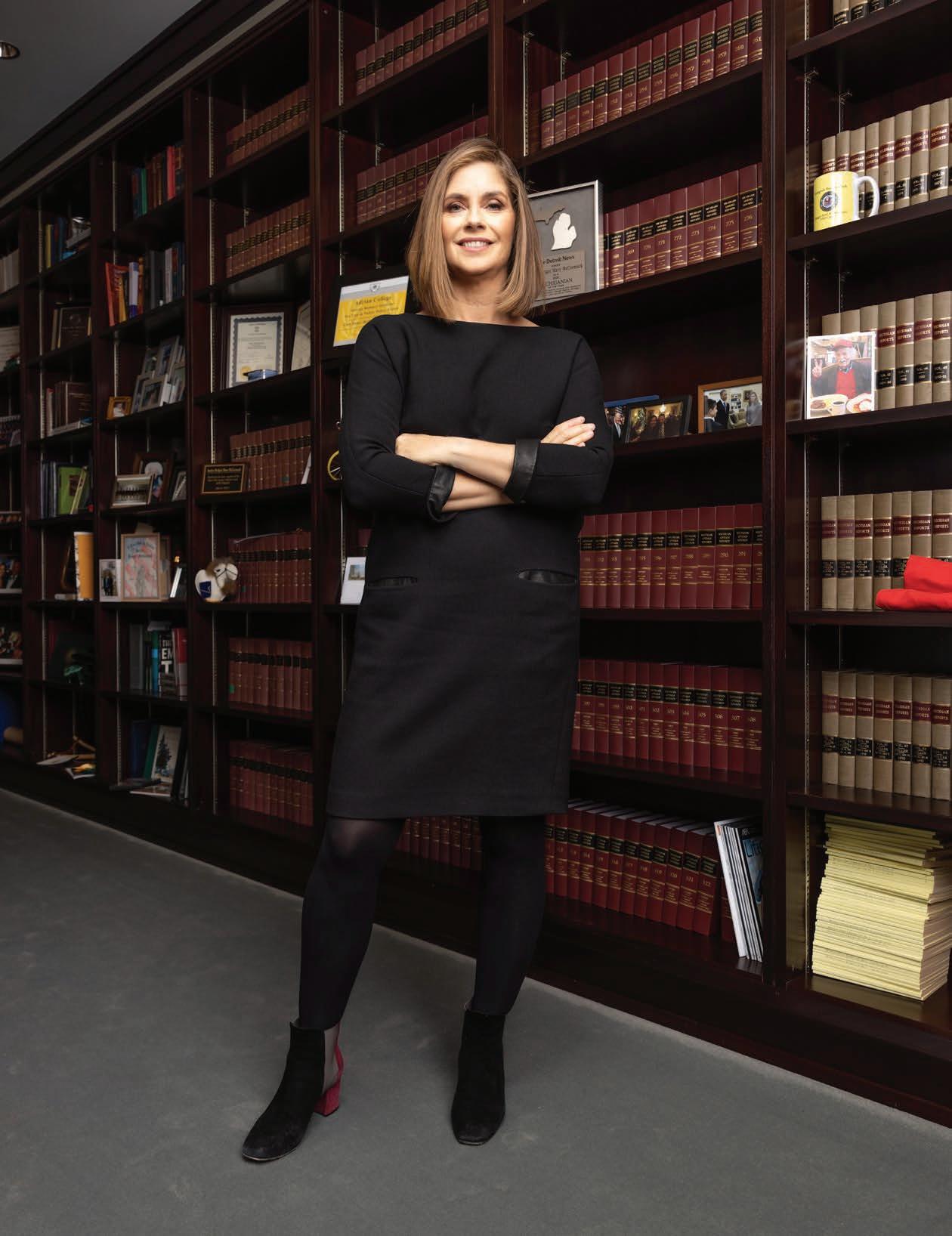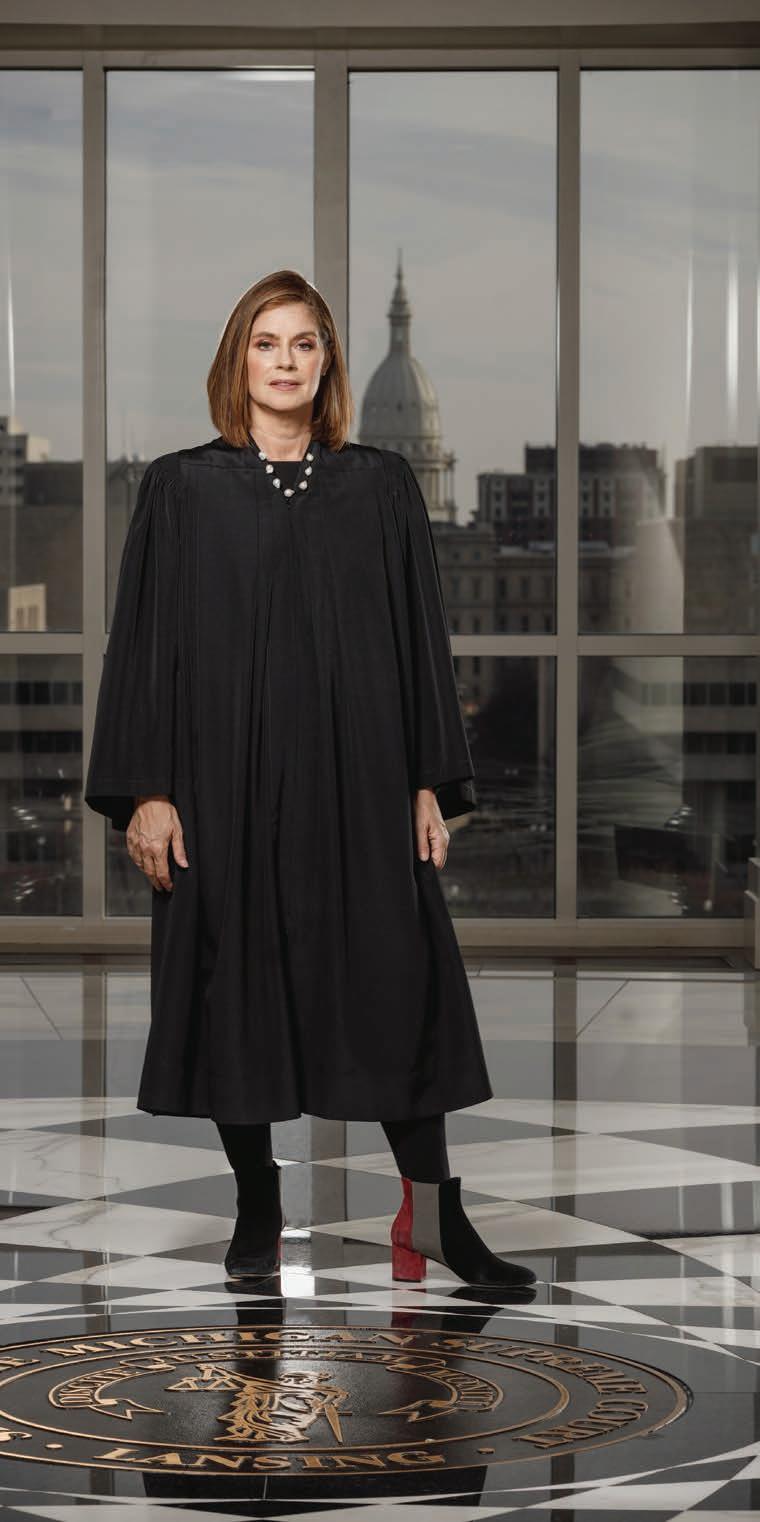
14 minute read
Making Michigan Courts Accessible for All with Chief Justice McCormack by Marji Wisniewski
Photo by GE Anderson
The day I spoke with Chief Justice Bridget McCormack was a momentous one for our state and our country. On December 14, 2020, I woke up to news that state buildings would be closed due to credible threats of violence. I wasn’t sure if my Zoom interview with the Chief Justice was still going to happen. But at 10am that morning, we connected via video chat. We spoke about the significance of the day. That morning, the first American outside of a trial would receive the COVID-19 vaccine. It was also the day the electoral college would officially cast their ballots for our next president. Chief Justice McCormack would go on to swear in the electors later that afternoon.
Advertisement
With all this going on (and frankly, with the year we’ve had), I wasn’t sure what to expect from our interview. I was completely in awe of the Chief Justice’s kindness, humility, and sincerity. She genuinely wants the best for us Michiganders when it comes to our justice system. She wants the courts to be accessible to all, and to be a place of healing. It’s reassuring to know Chief Justice McCormack is in our corner and in Michigan’s highest court.
INSPIRATION LEADS TO A STRONG FOUNDATION
When I was a young girl, I would periodically pack up my things and leave my home in New Jersey for the big city. My godmother lived and worked in New York City and she would let me stay with her occasionally. She was always extra attentive to me. I’m not sure if it was because she didn’t have children of her own, or that we had a special bond; maybe it was both. As a legal aid lawyer, she helped New Yorkers who couldn’t afford legal representation. I grew up watching her help people navigate the justice system. I have no doubt that this inspired me and played a role in my career choice.
After attending NYU Law School, I too started out as a legal aid lawyer in New York City. I was a public defender, representing New Yorkers accused of crimes. We handled very high caseloads, which impacted the quality of representation each client received. For this reason, the New York City Legal Aid Union went on strike in 1994 — not for increased wages, but to get more help with our caseloads. We felt we couldn’t fairly represent the number of clients we had been assigned. The mayor of the city at

Photo by GE Anderson
the time was Rudy Giuliani. He disagreed with our purpose to strike. So, instead of working with us on a solution, he canceled the City’s contract with the Legal Aid Society, and we were all fired.
I found myself without a job and with law school loans to pay. I didn’t have any savings; I needed to find a job, and fast. I first took a job with an appellate office for a yearlong assignment. Next, I found a position with Yale Law School for a two-year teaching fellowship. I was doing clinical teaching, meaning that part of my instruction involved representing clients who couldn’t afford lawyers. I realized that I really liked this kind of work, so I went on the job market to find a more permanent placement. I found this great opportunity at the University of Michigan Law School. Looking back on this, I’m thankful that Giuliani fired me, as it was what put me on the path to the next phase of my career.
In 2012, with the encouragement of my students and colleagues, I ran for an open seat on the Michigan Supreme Court. I had the naïve idea that I would have something important to contribute. I wasn’t really sure what I was getting into. I didn’t have any experience in politics, but I forged ahead and tried to figure out what it took to run for office. What a learning curve it was!
If I’d known beforehand what it would take to run, I’m not sure I would’ve gone through with it. In that way, I’m grateful for my naivety. I like to tell the folks I mentor not to overplan. Be willing to jump in to try new things; otherwise, you can talk yourself out of an opportunity by overthinking it. That year, I was elected to the Michigan Supreme Court. In 2019, the Michigan Justices chose me to be Chief Justice.
David Lewis by Emily Rose Imagery When I first came to Michigan, I thought food stamp eligibility to getting a personal I’d stay for five years or so, and then move protection order. However, data from the back to the East Coast. However, I fell in love website showed that one legal area proves with the state and never wanted to leave. I especially difficult for self-represented think it’s one of the most beautiful places in litigants: expungement. Most people who the world. I’ve been fortunate to stay here started the expungement toolkit online didn’t to grow my career and raise my family. The finish. That particular process can be quite University of Michigan remains important complicated. But data has also shown that to us. I still teach one class a year at the expungement opens up so many possibilities law school. The Law Library is one of my for a person by clearing their criminal record. favorite places, period. I just don’t want to cut ties with that outstanding institution. I In order to help with this process, the have a son who graduated from Michigan and Michigan State Bar Foundation, along with is now doing a post-baccalaureate program a variety of law students and judges, put there while working at the University of together a traveling expungement clinic that Michigan hospital. I have another son in the travels to more isolated parts of the state middle of his senior year there. Plus, U of M (rural and northern communities) to help is surrounded by such an awesome town. those eligible with the process. By taking Ann Arbor has so many quirky institutions, the show on the road, they were able to restaurants, and people. There aren’t many process more expungements that people places that have quite the same feeling of were entitled to. It became so popular that this unique community. People really care we actually opened up the Hall of Justice in about one another here. It’s a special place. Lansing to the clinic for a day. It was really cool to see a group of people show up who BRINGING THE COURT TO THE PEOPLE needed help that we could provide them.
The number of people in our country and state that need legal services is significant. In Michigan, about eight out of ten people who have some type of legal problem can’t afford a lawyer to guide them. This means that some try to navigate the system alone, and others don’t even try. The courts are hard without the help of a lawyer. We speak a different language than the public. The court system was built 200 years ago on the assumption that there would be very few disputes and all people would be represented by lawyers. The current rules and the statutes were built around these assumptions that are mostly not true today.
Michigan has tools that address this challenge. For one, we have what I believe is the best website in the country that helps people who don’t have lawyers. The website www. michiganlegalhelp.org is full of toolkits that enable people to navigate legal issues by themselves. 50,000 people each week use the site for assistance on issues ranging from This past year, I’ve been incredibly proud of Michigan’s trial judges, court administrators, and court staff who have led the nation in figuring out how to make justice accessible — all while largely working remotely. It took lots of extra hours and lots of learning. It’s been inspiring to see the judges and court staff across the state respond to this challenge in unison saying, “We can do this.”
A local example of this is of a magistrate in Ann Arbor who worked with a police officer in town. The officer would go to a local park where many of Ann Arbor’s homeless people congregate. The officer would then use his phone to sign into a Zoom meeting with the magistrate to help clear their warrants right there in the park. They were literally taking the court to the people, right where they were. This past year has been full of opportunity, and seeing people run with that has made me really proud of Michigan’s Judiciary. It’s unleashed a level of innovation that’s been inspiring to witness.
Chief Justice McCormack’s Message for Our Youth:
The youth are not only watching, but they’re also giving us hope. My message to young people is a simple “Thank you.” You have sustained me throughout all of last year. Seeing how strong you are, how serious you are about taking care of one another, and taking care of us, inspires me.
My college-aged kids, from the beginning, have been better at dealing with the quarantine and other changes than I have. I see so much potential in the younger generation. They’re focused on ideas that will save the world. They care about their community and about one another. It’s not a selfish generation, and for that I’m full of gratitude.
You’re already better than us. You’re going to inherit this world — so go on and take it!
Photo by GE Anderson
Courts and lawyers haven’t always been quick to change, and at times, they can actually resist innovation. This makes sense, as the entire profession is based on respecting decisions that have been made in the past. But in 2020, all of a sudden we couldn’t resist change anymore. This taught us that not only could we do things differently (and some of that would be better), but we also learned that we had room to experiment. We had to act as entrepreneurs instead of lawyers.
One example of how the Michigan Supreme Court pivoted last year was when we quickly rolled out online dispute resolution statewide on a free, user-friendly platform. The resource is something people can use on their own time, with or without a mediator to resolve their disputes. I believe that we’re currently the only state offering this statewide. It makes a huge difference in how many Michiganders experience the court system.
Over the last year, our Michigan courts have performed over two million hours of Zoom hearings. Our courts livestream these hearings over YouTube, so the public can access them. We have to be mindful of people who could be excluded because they don’t have access to the internet or broadband. Better internet access is important to access to justice. But it’s important to remember that before we had remote options, some people were still excluded from justice — like people who lacked transportation, or couldn’t get a day off from work, or had children or others they alone cared for. I believe that being able to use the available tools effectively will give us better options for how we deliver service to the people of Michigan going forward.

Photo by GE Anderson
ON A PERSONAL NOTE
Personally, this year, I’ve learned a ton of new tricks. I used to spend a lot of time in my car or flying to other states. I’m not sure that I’ll do that as much anymore now that we have these online tools. There will be times when an in-person meeting is simply better, but now we have more choices.
Last night, I watched an online concert by the musician Andrew Bird. He usually does this December concert every year in Chicago. I don’t think I would’ve driven to Chicago to see it. But I watched it on my TV at home, and it was really cool. I was watching it with people from all over the world. The sound and video were far better that a live performance. I could actually see his fingers plucking the violin. It brought me a lot of joy during a much-needed time over the holiday season.
Like everyone else, not being able to see certain people because of this pandemic has worn me down; I miss seeing my parents most of all. They’re in their 80s and have health issues typical of their age. My dad is 81 and has bladder cancer. He had his bladder removed last January. For a while, he thought he wasn’t going to have the surgery. He volunteered for hospice for 30 years; he knows how to die with dignity, and he thought it was probably time for him to do that. Then my brother had his first baby, and my dad was like “Nope, I’m going to try to stay alive for a while to be with my grandchild!” Unfortunately, 2020 had other plans. Due to the pandemic, he hasn’t been able to see my nephew, as my brother is a plane ride away. I hope that by the time this article is published, he’ll be able to receive the vaccine. 2021 is looking up for a lot of reasons.
THERE IS MORE WORK TO BE DONE
I don’t have a lot of regrets in my life. I’ve been fortunate and blessed with so much support. If anything, I wish that I had more time for all the things that I still want to do. There’s still
some big work to do to make our courts accessible to all. We have this great Justice for All taskforce. We want to make Michigan a national leader in providing 100% access to the civil justice system. This will take a continued effort and an enormous reorientation of how we do what we do. But I’m going to continue working on it to ensure that we can make our justice system work more responsively for the people in the state who can’t afford lawyers.
We can also do a lot more for families struggling with poverty, substance abuse, and mental health issues. We’re working on how we can be more helpful to parents and kids who end up interacting with the court system. We’re interacting with them already; why not use this moment to help them?
I believe in moving our criminal justice system in a direction that focuses more on accountability and healing instead of vengeance. The criminal justice system has an important opportunity to serve as a source of healing for people who have violated the law and people who have been harmed by those violations. We’re living in a moment in time where a lot of people are interested in this idea. We’ve seen communities elect prosecutors who share these values, and we have bipartisan interest in the legislature here in Michigan for a lot of front- and back-end criminal legal system reform. The Jail Task Force that the Lieutenant Governor and I have chaired has been extremely successful in pushing our recommendations to policy. I feel like we’re at the tip of something big where justice system reform is concerned, and I want to keep being a part of pushing that further.
2021, A TIME FOR HEALING
Over my 21 years as a lawyer, I came to know many of my clients personally. I cared about them and saw the way the legal system made it harder for them to heal, make progress, and contribute to their community instead of taking from it. Reflecting on their names, faces, and stories is a good motivator now that I’m in a position to be part of the solution.
My experience has led me to believe that the courts need to be more of a service than a place. People who need the service of a court are typically really hurting. Normally, people need the court when something isn’t going well — maybe really not well. It can be a situation where people are stressed out, maybe even traumatized. I like to think of courts as being more like emergency rooms than anything else.
/ letsgoblow


335 S. Main Street Ann Arbor, MI 48104 734.263.7610
This past year and coming year is a time of tremendous transition for courts and the legal profession. It’s long overdue. The events of 2020 accelerated so much, so quickly. Today, we can think more methodically about how to offer our services to the people. The courts can be a source of healing by connecting people to resources as often as they can deliver consequences. The change we’ve been through is going to build a more transparent, accessible, and efficient justice system. That excites me and motivates me to keep moving forward, to serve our great state of Michigan.
With a passion for marketing that started as a young girl, Marji Wisniewski created her own marketing and communications organization in 2017. As owner of Blue Zebra Marketing Solutions, she helps local and regional businesses and non-profits tell their story through branding, graphic design, content creation, and PR, focusing on customized solutions for each client that are more unique than a zebra’s stripes.
A Michigan native, Marji received her bachelor's from Western Michigan University and master’s from Wayne State University. When not working you can find her gardening, doing Pilates, listening to podcasts, and spending time with her family and two dogs.

